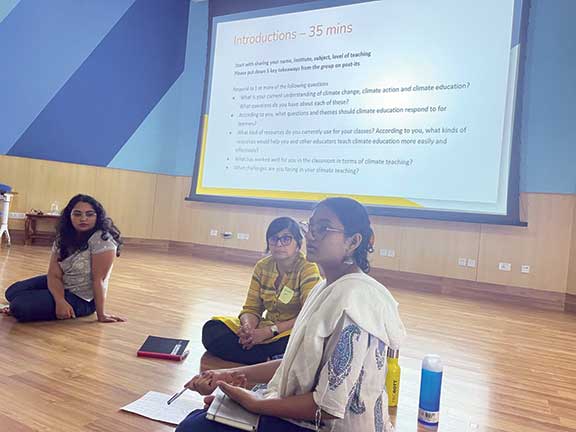Sunayana Ganguly
The most valuable resource that all teachers have is each other. Without collaboration, our growth is limited to our own perspectives. – Robert John Meehan
We are teaching in a climate emergency. Sandwiched between overwhelming disasters like floods and collapsing ecosystems, teaching about climate change and its multi-dimensional impacts needs the perspectives of different disciplines and approaches. Climate change is anthropogenic and is shaped by human decisions, behaviours, and values. These are shaped by societal attitudes towards Nature that are mirrored in homes and schools, which serve as important, value shaping institutions. They have the potential to be sites of transformative intervention to inculcate a more balanced understanding and relationship with the natural world.
Studies in developed countries show the potential of environmental literacy to improve behaviour and impact carbon emissions1. Yet this is an area in India that has historically privileged skills over values, focusing too narrowly on the technical or marketable skills. Less focus is given to problem solving, critical thinking, creativity, resilience, and empathy. This focus on the scientific and technical divorced of wonder, respect, and connection with the natural world, has failed to foster understanding, care and collaboration with the environment. This leaves people feeling disempowered by the impacts of climate change, alienated from the systems that shape them.
Comprehensive climate education equips people to think “out of the box2” and emphasizes adaptability, flexibility and community building. It is designed to be a “social holistic learning process” that embeds learning action in local community contexts. The idea is to build capacities – physical, emotional, and intellectual to reduce overall vulnerability.3 This creative and integrative approach to climate education is not part of formal curriculum in India, and time and syllabus pressures often do not allow for this kind of flexibility in teaching approaches. Climate education in the country remains taught in silos, divorced from its complex connections to other disciplines and communities. In addition, there are very few India-specific climate education resources that can support interdisciplinary teaching.

Our goal in setting up the Climate Educator Network*, has been to build a supportive network in order to create systemic change from the ground up. This Network was the result of a collaboration between Azim Premji University and the Initiative for Climate Action. It has been meeting for workshops annually, largely online as part of Global Climate Change Week for the last two years (October 2020-22). It currently has around 200 member educators on its mailing list. Some key questions that have come up through the workshops that will need more collective deliberation are:
• How do we operationalize creative and adaptive learning frameworks in our everyday teaching?
• What is our broader role as a community of educators who care about the climate crisis?
• How can we contribute and support one another as a community?
• How can we advocate for the larger community of educators to integrate climate change into their disciplines?
Educators need to work together as an interdisciplinary climate teaching community to answer these questions in order to affect meaningful and widespread climate action. To achieve this, we need to come together and engage with teachers who are interested in understanding and linking climate education to their disciplines and forums. This networked teaching community can become a space for peers to design, create and share teaching resources and strategies, case studies, and lesson plans. Most importantly, this network can facilitate an integrative and collaborative approach between the social and natural sciences.
To this end, educators as a community have begun responding to this challenge. There are existing networks like Teachers against the Climate Crisis4. Having spaces like the Climate Educator Network has led to further cross-institutional initiatives like collaboration with the TROP-ICSU5 platform, hosted by Flame University, which has a growing repository of climate teaching resources across disciplines. Apart from collating and sharing teaching resources, these networks allow educators to respond as a collective, giving critical peer support and a space for reflection, solidarity, and purpose. These networks have open-source resources that can be accessed by anyone and are free to use. We invite people to add to these common pool resources and grow the network to include educators across the country from all disciplines.
Scalable change is only possible if educators support one another as a community to integrate climate learning into their disciplines and operationalize new frameworks of learning and teaching. This would mean collectively thinking out of the box, not as individual disciplinary thinkers but as a collective who have the agency to shape what the future could think like.
References
- Cordero, E. C., Centeno, D., & Todd, A. M. (2020). The role of climate change education on individual lifetime carbon emissions. PLOS ONE, 15(2), e0206266.
- Glasser, H. (2007). Minding the gap: The role of social learning in linking our stated desire for a more sustainable world to our everyday actions and policies. In A.E.J. Wals (Ed.), Social learning: Toward a more sustainable world (pp. 35-61). Wageningen: Wageningen. Academic Publishers
- Anderson, A. (2012). Climate change education for mitigation and adaptation. Journal of Education for Sustainable Development., 6(2), 191-206. Curriculum Perspective
- https://teachersagainstclimatecrisis.wordpress.com/
- https://tropicsu.org/
*Please reach out to the author if you want to access the compilation of existing climate education resources or want to be part of future events
The author is a political scientist who works on environment politics, forest governance, sustainable consumption and cities. She is a faculty member at the School of Policy and Governance, Azim Premji University and a collaborator with the Initiative for Climate Action. She can be reached at sunayana.ganguly@apu.edu.in.
